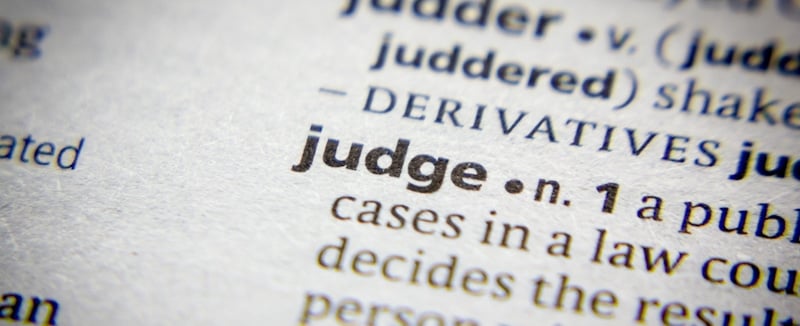Sometimes, capitalizing various words can get all confusing. Typically, this is due to the wide range of grammatical rules that guide capitalization. One word that has attracted a wide range of attention is the word “judge”. So, you might be wondering, do you capitalize the word judge, when and when not to.
You are expected to capitalize the word “judge” when you use it as the title of a person. In such cases, it does not matter if you used it in a direct address. On the other hand, you do not need to capitalize it where you use it as an office within a sentence. In such a case, it is just another word.
However, grammatical rules regarding capitalization can be somewhat confusing. As such, there are variants to stipulated rules. In this article, we will explore the rules fully with illustrative examples.

Rules For Capitalizing The Word “Judge”
There are various rules regarding the capitalization of the word “judge”. While they can sometimes be confusing, it is easier to understand them from two perspectives. Precisely, when to capitalize the word, and when not to capitalize the word.
So, now that we have cleared that up let us get right to the relevant rules.
When to Capitalize the Word “Judge”
Rule Regarding Its Use as An Extension to A Real Name or Preceding A Real Name
A consensus is that you should capitalize the word “judge” when you use it as a title. In such cases, you address the individual by his/her title. Note that while addressing them by this title, you do it as an extension of their name. That is, preceding their real name.
For instance, you will need to capitalize the word “judge” when you use it like this: Judge Sam Jones. In this case, you have extended the title as a part of Sam Jones’ name. As such, you need to capitalize the word “judge” just the way you would capitalize his name.
Similarly, this will also be the case where you use it as a replacement for someone’s real name. For instance, you might find it more convenient to refer to the Honourable Judge Sam Crane as just Judge Crane. In such a case, as we have done, you will need to capitalize the word “judge” to be grammatically correct.
Rule Regarding Its Use as A Title in Direct Address
Again, you will need to capitalize the word “judge” where you use it as a title. Only that in this case, you use it as a direct address to a judge. This is like replacing the judge’s real name with the word “judge”. In such a case, you need to keep it capitalized.
For instance, where you ask the judge about your liability for an act in a sentence, you will need to capitalize the word. As such, it is more of, “Do I have to pay a fine, Judge?” rather than, “Do I have to pay a fine, judge?”
Rule Regarding Its Use as the First Word in A Quotation That Forms A Complete Sentence
The general rule is that you capitalize the first word once you place a complete sentence in a quotation within another larger sentence. Note that this only applies where the words inside the quotation marks form a complete sentence. In a case where it is just a phrase, you do not capitalize.
This is also the case with the word “judge”. So, when it begins a quotation within a larger sentence that forms a sentence, you need to capitalize it. Note that, in most cases, this will overlap with the rule regarding its use as an extension of someone’s name.
In turn, this might lead you to confuse it with the same rule. However, they are different. Even more, there are special cases where there is no overlap. This is where this rule becomes even more relevant.
When Not to Capitalize the Word “Judge”
The consensus is that you do not capitalize when using the word as a position within the sentence. In such a case, it is just another word, and you must use it as such.

Also, you do not need to capitalize the word when you use it as just another word in a sentence. In such cases, it performs an auxiliary function of describing a role rather than depicting a title. Note that this is an extension of its use as a position.
Alternative Rules
One thing that might appear confusing is the capitalization of the word court. And this is relevant. Precisely, you will need to use the word regularly if you are one that uses the word “judge” regularly in your vocabulary.
Guess what. There is no point in getting the correct capitalization of the word “judge” if you will just use an incorrect capitalization of the word “court”. So, here is what you need to know.
Rules Regarding the Capitalization of the Word “Court”
You will need to capitalize the word “court” if you use it to refer to a judge sting on a case. In such a situation, the word has a formal appeal that requires you to capitalize it. This is because it now represents an entity that can act. For instance, the Court can overturn a previous decision.
Also, you need to capitalize the word when you use it as a superior court of record. Again, in such a case, it is a formal entity with the capacity to act on various issues and make decisions. As such, you will need to capitalize it.
However, you do not need to capitalize it where you use it as a general term without reference to any courthouse.
Illustrative Examples
We have identified the various rules guiding the capitalization of the word “judge”. However, you just might be wondering how it plays out in sentences and general usage. Well, here are some illustrative examples that should help you get by.
Rule 1: Capitalize When You Use the Word “Judge” as an Extension to A Real Name or Preceding A Real Name
Incorrect
- Did judge Eugene award damages to the young man who got injured in the accident?
- One thing we can say for sure is that Judge Eugene has a friend that holds him in high regard in judge Jones
Correct
- Did Judge Eugene award damages to the young man who got injured in the accident?
- One thing we can say for sure is that Judge Eugene has a friend that holds him in high regard in Judge Jones
Rule 2: Capitalize When You Use It As A Title Inside A Direct Address
Incorrect
- Can we get straight to presenting our point, judge?
- Do we need to appear in person next week for the trial stage, judge?
Correct
- Can we get straight to presenting our point, Judge?
- Do we need to appear in person next week for the trial stage, Judge?
Rule 3: Capitalize When You Use It as the First Word in A Quotation That Forms A Complete Sentence
Incorrect
- The Registrar said, “judge Jones will arrive shortly and plans to attend to all matters listed for today,” only to get called afterward that the judge will be absent.
- My friend has no faith in judges that he once said, “judges have no better moral integrity than the common man.”
Correct
- The Registrar said, “Judge Jones will arrive shortly and plans to attend to all matters listed for today,” only to get called afterward that the judge will be absent.
- My friend has no faith in judges that he once said, “Judges have no better moral integrity than the common man.”
Rule 4: Do Not Capitalize When You Are Just Using the Word as A Position Within A Sentence
Incorrect
- I just want a Judge to be my friend before the end of the year
- I have always wanted to become a Judge right from my childhood
- I regularly stay up all night to download the Judge’s debate
Correct
- I just want a judge to be my friend before the end of the year
- I have always wanted to become a judge right from my childhood
- I regularly stay up all night to download the judge’s debate
Rule 5: Capitalize It When It Refers to A Presiding Judge or A Superior Court of Record
Incorrect
- The Supreme court just gave its decision on the issue
- The court will declare its judgment in a few minutes
- If the court wishes, we would like a recess of 15 minutes
Correct
- The Supreme Court just gave its decision on the issue
- The Court will declare its judgment in a few minutes
- If the Court wishes, we would like a recess of 15 minutes
In Conclusion
You might find it challenging getting accustomed to the capitalization of the word “judge”. However, it is not as complicated as you would have yourself believe. We have discussed all the relevant rules with illustrative examples. So, read up and enjoy better grammatical construction.
Shawn Manaher is the founder and CEO of The Content Authority. He’s one part content manager, one part writing ninja organizer, and two parts leader of top content creators. You don’t even want to know what he calls pancakes.


